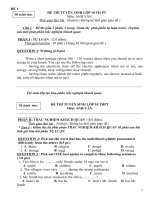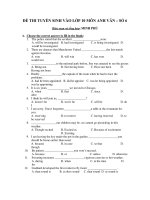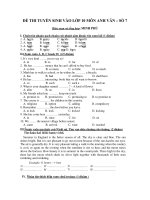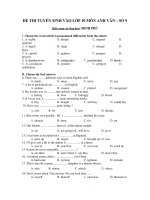Đề thi tuyển sinh vào lớp 10 môn anh văn – số 9
Bạn đang xem bản rút gọn của tài liệu. Xem và tải ngay bản đầy đủ của tài liệu tại đây (91.88 KB, 4 trang )
ĐỀ THI TUYỂN SINH VÀO LỚP 10 MÔN ANH VĂN – SỐ 9
Biên soạn và tổng hợp: MINH PHÚ
I. Choose the word which is pronounced differently from the others:
1. A. traffic B. distant C. channel D.
national
2. A. beach B. clean C. instead D.
leave
3. A. control B. opinion C. purpose D.
grocery
4. A. thunderstorm B. earthquakes C. grandmother D. thanks
5. A. conclusion B. creature C. category D.
celebration
II. Choose the best answer:
6. There are different ways to learn English well.
A. much B. many C. more D. any
7. A lot of periodicals are in English.
A. spoken B. created C. printed D. recognized
8. His lecture was so that nobody wanted to hear.
A. boring B. bore C. boringly D. bored
9. If I were you, I some interesting books.
A. buy B. bought C. will buy D. would buy
10. Have you gone skiing ?
A. ever B. for C. just D. already
11. Ben writes very quickly . He’ s finished his essay.
A. already B. been C. for D. yet
12. Our friends meet us at the airport tonight.
A. are B. are going to C. will be to D. go to
13. I was born in Scotland but I in England.
A. grew up B. raised C. brought up D. rose
14. I’ll give you a lift to the station if in a hurry.
A. you’re B. you’ll be C. you were D. you'd be
15. Exams are never enjoyable, ?
A. are there B. aren’t there C. are they D. aren’t they
16. A tropical storm called a in China.
A. hurricane B. cyclone C. typhoon D. tornado
17. This is the old woman daughter is a famous doctor.
A. who B. whom C. which D. whose
18. Don’t worry about Tom and me. We can look after
A. myself B. himself C. ourselves D. themselves
19. Helen is my aunt’s daughter. She is my
A. sister B. nephew C. cousin D. niece
III. Arrange the given words to make the completed sentence:
20. student / books / one / there / for / have / are / enough / each / to.
A. There are books enough for student to have one.
B. There are enough books for student to have one.
C. There are books enough to have for student one.
D. There are enough books to student have for one.
21. now / studies / he / to / every / night / used / he / dance / but.
A. He used to dance every night, but now he studies.
B. Now he used to dance every night, but he studies.
C. He used to studies every night, but now he dance.
D. He studies, but now he used to dance every night.
22. yesterday / I / brother / bicycle / repair / elder / the / my / had.
A. I had the bicycle repair my elder brother yesterday.
B. I had repaired my elder brother the bicycle yesterday.
C. I repair the bicycle my elder brother had yesterday.
D. I had my elder brother repair the bicycle yesterday.
23. would / holiday / you / like / to the / summer / with / spend / us ?
A. Would you like to spend holiday summer with us ?
B. Would you like to spend with us summer holiday ?
C. Would you like to spend summer holiday with us ?
D. Would you like spend to summer holiday with us ?
III. choose the mistake and correct:
24. Although my next-door neighbor is not very cleverly, he is hard-working.
A B C D
25. Jim is much intelligent that he always understands what I say.
A B C D
26. They sing so beautiful that everyone wants to listen to them.
A B C D
27. She is so a good student that all her teachers like her.
A B C D
28. The child often cry at night and this makes the mother sleepless.
A B C D
IV. Choose the best answer to fill in the blank:
Public transport (29) London is expensive. The fare depends on the length
of the (30) ; you can not buy books or tickets in advance. Children under sixteen pay
half, (31) children under five travel free. But (32) some buses you pay the
drivers. Most London (33) are double-deckers. On the underground railway ( or
tube ) you (14) your ticket from a machine or at the (35) of the
journey. Not all trains from one platform go to the same place, so watch the signs. The
latest train leaves at about 00.15.
29. A. at B. in C. from D. to
30. A. journey B. visit C. picnic D. street
31. A. such B. or C. so D. and
32. A. on B. in C. at D. for
33. A. buses B. trains C. planes D. cars
34. A. have B. buy C. see D. take
35. A. last B. finish C. end D. after
V. Read the passage and choose the best answer:
Every year people in many countries learn English. Some of them are young children.
Others are
teenagers. Many are adults. Some learn at school. Others study by themselves. A few
learn English just by hearing the language in films, on television, in the office or among
their friends. Most people must work hard to learn English.
Why do all these people learn English? It’s not difficult to answer this question.
Many boys and girls learn English at school because it is one of their subjects. Many
adults learn English because it is useful for their work. Teenagers often learn English for
their higher studies because some of their books are in English at the college or
university. Other people learn English because they want to read newspapers or
magazines in English.
36. According to the writer. English is learn by
A. young children B. adults C. teenagers D. all
are correct
37. In the line 2 of the second part, the word “it” refers to
A. country B. young children C. English D.
question
38. Where do many boys and girls learn English?
A. at home B. at school C. in evening classes D. in
the office
39. Why do adults learn English?
A. Because they want to see movies in English B. Because they need
it for their job.
C. Because they are forced to learn it D. Because it’s not difficult to
learn.
40. What of the following is NOT mentioned in the passage?
A. Children like reading English newspapers B. People in many countries
learn English
C. English is one subject in school. D. Some books are written in
English.









